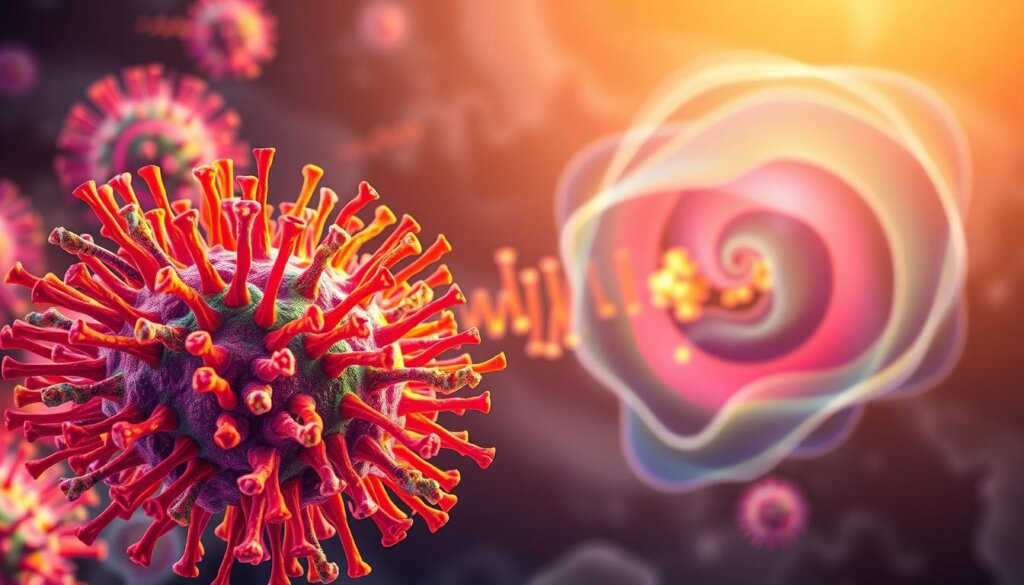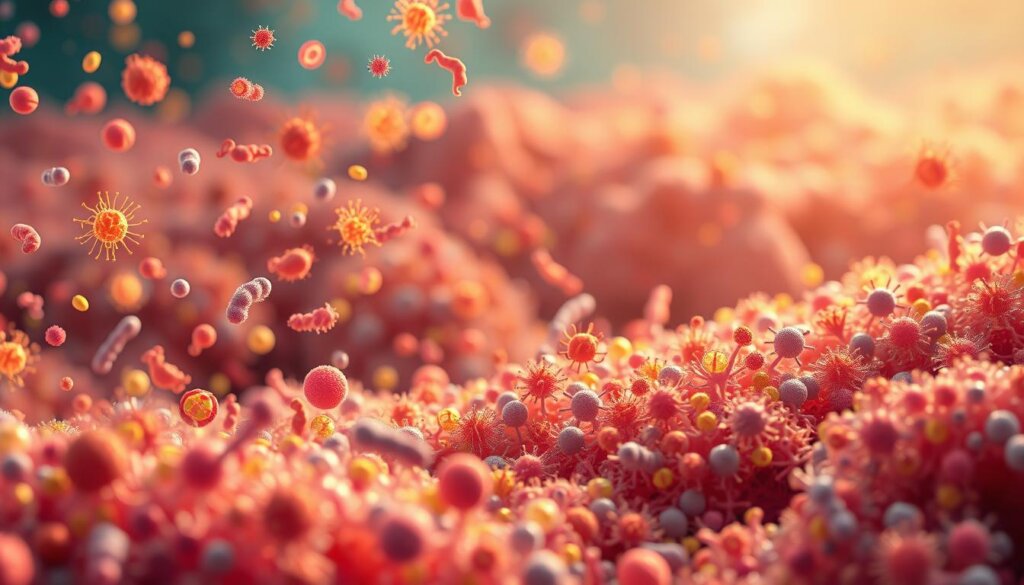What if tiny organisms living in your gut could be the secret weapon your body needs to fight off illnesses? Science says they can. These microscopic helpers, known as probiotics, do more than aid digestion—they actively shape how your body defends itself against threats.
Probiotics are live microorganisms that provide health benefits when consumed regularly. Studies show they interact directly with immune cells, helping regulate defenses against viruses, bacteria, and other harmful invaders. This article explores three key health benefits of these friendly microbes, focusing on their ability to strengthen natural protection systems.
Your gut houses nearly 70% of your immune cells. When balanced, this environment acts like a command center, directing responses to pathogens while preventing unnecessary inflammation. Research reveals specific strains enhance gut barrier function and produce compounds that neutralize threats before they spread.
But how exactly do these microbes communicate with your body? They trigger signals that calm overactive immune reactions—a critical factor in managing allergies or chronic inflammation. Emerging evidence also suggests they train immune cells to recognize real dangers faster, creating a smarter defense network.
Key Takeaways
- Probiotics directly interact with immune cells to enhance defense mechanisms
- They help regulate inflammatory responses to prevent tissue damage
- Specific strains strengthen gut barrier function against pathogens
- Microbial balance influences 70% of the body’s immune activity
- Clinical studies link probiotics to reduced infection rates
For personalized advice on choosing the right probiotic supplements, contact Wellness Group Malaysia via WhatsApp at +60123822655. Their experts can guide you toward solutions tailored to your unique health needs.
Introduction to Probiotics and Immune Health
Imagine trillions of microscopic allies working daily to keep your defenses sharp. These live microorganisms, particularly strains like Lactobacillus and Bifidobacterium, form partnerships with your body that date back millennia. “The gut isn’t just for digestion—it’s the frontline of immunity,” notes a 2023 study in Gut Microbes Journal.
Your digestive tract hosts a bustling community of bacteria, fungi, and other microbes. This ecosystem doesn’t just break down food—it trains immune cells to distinguish friend from foe. When balanced, these microorganisms strengthen intestinal barriers and produce compounds that block harmful invaders.
Three key players dominate probiotic research:
- Lactobacillus: Fights pathogens while calming inflammation
- Bifidobacterium: Enhances nutrient absorption and immune signaling
- Saccharomyces: Supports recovery from microbial imbalances
Nearly 70% of immune activity originates in the gut. Beneficial bacteria here act like coaches, teaching defense systems to react appropriately to threats. They also release short-chain fatty acids that nourish intestinal cells—a critical step in maintaining barrier integrity.
Modern science continues uncovering how specific strains influence immunity. For example, Lactobacillus rhamnosus GG has shown remarkable ability to reduce respiratory infections in clinical trials. These findings highlight why maintaining microbial diversity matters for year-round wellness.
Understanding the Role of Probiotics in a Strong Immune System
Your body’s defense network relies on unseen collaborators working behind the scenes. These microscopic partners don’t just occupy space—they actively train protective forces to respond effectively to challenges.

Defining Microbial Partnerships
Beneficial bacteria function like skilled diplomats within your gut. They negotiate with protective cells, enhancing their ability to identify real threats while calming unnecessary alarms. This balanced approach helps maintain what scientists call immune homeostasis—the ideal state between vigilance and overreaction.
Three key actions demonstrate their effects:
- Activating early-warning receptors that detect microbial patterns
- Producing compounds that strengthen intestinal barriers
- Directing specialized cells to neutralize invaders efficiently
Transforming Defense Strategies
These microorganisms communicate through sophisticated chemical signals. A 2023 review in Nature Immunology notes: “Probiotic strains act as biological instructors, shaping both immediate and long-term immune responses.”
Their training program for protective cells includes:
- Teaching dendritic cells to activate appropriate defenses
- Guiding T-cells to remember past invaders
- Helping macrophages clean up cellular debris
This dual-action approach explains why consistent probiotic use correlates with fewer seasonal illnesses in Malaysian clinical studies. By supporting both rapid response teams and strategic memory cells, these microbes help create adaptable, resilient defenses.
Mechanisms of Probiotics on Immune Regulation
Your immune system operates like a well-trained army, and probiotics serve as its strategic advisors. These beneficial microbes fine-tune defense mechanisms through two key approaches: rapid frontline protection and long-term threat recognition.
Activation of Innate Immunity
Probiotics act as first responders when threats emerge. They lock onto intestinal lining cells, triggering the release of antimicrobial compounds. This interaction strengthens physical barriers while activating sentinel cells like macrophages – your body’s cleanup crew.
Three critical actions occur:
- Production of protective proteins that neutralize invaders
- Enhanced mucus layer maintenance
- Rapid alerts to natural killer cells
Modulation of Adaptive Immune Responses
Beyond immediate defense, these microbes teach your system to recognize repeat offenders. They influence specialized cells that archive threat blueprints. A 2023 clinical review highlights how specific strains promote regulatory T-cell development – your body’s peacekeepers preventing friendly fire.
This training results in:
- Balanced inflammatory responses
- Improved threat discrimination
- Faster pathogen recall
Short-chain fatty acids produced by gut bacteria act as molecular messengers. They help dendritic cells coordinate appropriate immune actions – like switching from attack mode to damage control when threats subside.
Probiotic Strains and Their Specific Effects
Not all probiotics work the same way—their benefits depend on the unique abilities of each strain. Researchers have identified distinct microbial “specialists” that target different aspects of immune health. This precision explains why choosing the right formulation matters for optimal results.

Notable Lactobacillus and Bifidobacterium Species
Lactobacillus acidophilus ranks among the most versatile strains, particularly for men’s health support. Studies show it activates genes producing interferon-beta—a key antiviral compound. This action helps create layered protection against respiratory infections.
The Lactobacillus rhamnosus GG strain produces p40 proteins that repair intestinal damage. In clinical trials, these proteins reduced colitis symptoms by 47% compared to placebos. Meanwhile, certain Lactobacillus plantarum strains boost interleukin-10 production, calming excessive inflammation.
Strain-Specific Immune Functions
Bifidobacterium species like B. longum excel at training regulatory T-cells. These peacekeepers prevent immune overreactions while maintaining threat detection. Infant-focused strains differ from adult-targeted varieties, proving effectiveness depends on life stage.
Forty-two Lactobacillus plantarum variants demonstrated wildly different cytokine stimulation levels. One strain increased IL-12 production by 300%—vital for fighting bacterial invasions. Such variations highlight why generic probiotic blends often underperform compared to targeted solutions.
Scientific Insights from Recent Research
Modern science is decoding probiotic secrets at the molecular level. Advanced genomic studies reveal how specific bacterial genes produce compounds that train immune cells to respond smarter, not harder. One breakthrough showed a five-strain blend (L. acidophilus, L. casei, B. bifidum, and others) triggering dendritic cells to release IL-10 and TGF-β – natural inflammation brakes.
Proteomic analysis uncovered 74 unique proteins in Bifidobacterium strains. Thirty-one directly interact with human cells, acting like biological instruction manuals. These proteins:
| Strain | Key Compound | Immune Function |
|---|---|---|
| L. rhamnosus GG | p40 proteins | Repairs intestinal lining |
| B. longum | Short-chain fatty acids | Boosts T-cell regulation |
| S. thermophilus | Cyclic dipeptides | Blocks pathogen communication |
Malaysian clinical trials highlight personalized responses to targeted probiotic formulations. Genetic differences explain why some people see faster results – a game-changer for treatment plans. Researchers now use AI to match strains with individual DNA profiles.
These discoveries prove probiotics work through multiple channels simultaneously. They don’t just add troops to your defenses – they upgrade your entire security system. As one scientist noted: “We’re moving from generic supplements to precision microbial medicine.”
Health Benefits and Therapeutic Potential
Emerging research reveals how these microbial allies offer protection beyond basic wellness. Their beneficial effects span from preventing infections to repairing cellular damage, making them valuable partners in maintaining long-term health.
Reduction of Inflammation and Infection Risk
Studies demonstrate specific strains significantly lower inflammation markers linked to eczema and allergies. By stimulating antimicrobial peptide production, they create hostile environments for harmful bacteria. This dual action reduces infection risks while calming overactive immune responses.
Clinical trials highlight probiotics’ ability to shorten respiratory illness duration. The p40 protein found in certain strains repairs tissue damage caused by pathogens. These benefits make them promising allies for managing chronic inflammatory conditions.
Enhancement of Gut Barrier Function
A robust intestinal lining prevents toxins from entering the bloodstream. Probiotics strengthen barrier function by tightening cell junctions and boosting mucus production. This “sealant effect” proves particularly helpful after antibiotic use or digestive distress.
Research shows daily supplementation increases epithelial cell regeneration rates. For those considering daily probiotic use, experts recommend formulations containing Lactobacillus rhamnosus GG. Its proven track record in maintaining gut integrity supports both digestive and immune health.
These findings underscore probiotics’ expanding role in modern treatment approaches. From vaccine enhancement to autoimmune support, their therapeutic potential continues reshaping preventive healthcare strategies.
FAQ
How do probiotics support immune function?
Probiotics interact with gut-associated lymphoid tissue, enhancing immune responses by promoting antibody production and regulating inflammation. Certain strains like Lactobacillus rhamnosus also strengthen gut barrier function, reducing pathogen invasion risks.
Can probiotics help prevent infections?
Studies suggest specific strains, such as Bifidobacterium lactis, may lower respiratory or urinary tract infection risks by stimulating protective immune cells. However, effectiveness depends on strain selection and individual health conditions.
Are probiotics safe for infants?
Some strains, like Lactobacillus reuteri, are shown to reduce colic and diarrhea in infants. Always consult a pediatrician before introducing supplements, as immature digestive systems may react differently.
Do probiotics reduce inflammation in chronic diseases?
Research highlights strains like Lactobacillus plantarum for easing symptoms in inflammatory bowel disease or ulcerative colitis. These microbes produce short-chain fatty acids, which modulate inflammatory pathways in the gut.
How long does it take for probiotics to affect immunity?
Effects vary by strain and dosage. For acute issues like antibiotic-associated diarrhea, improvements may occur within days. Immune modulation for conditions like irritable bowel syndrome might require weeks of consistent use.
Can probiotics replace vaccines for immune protection?
No. While probiotics enhance natural defenses, they don’t provide targeted immunity against specific pathogens like vaccines. They work best as a complementary approach alongside standard treatments.
What foods are rich in immune-boosting probiotics?
Fermented options like yogurt (with Lactobacillus acidophilus), kefir, sauerkraut, and kimchi contain live microorganisms. Pairing them with prebiotic fibers from garlic or oats can amplify their beneficial effects.






